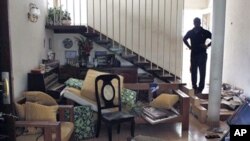Rebels fighting Ivory Coast's incumbent president say they have captured another key town on one of the main roads to Liberia. The fighting comes as African Union heads of state try to arrange a face-to-face meeting between Ivory Coast's rival presidents.
Rebels opposed to incumbent president Laurent Gbagbo say they have captured the town of Toulepleu, which is less than 10 kilometers from the Liberian border. Gbagbo government troops say they are responding with heavy weapons in a campaign to stop the rebels from moving farther south through what was previously a buffer zone between the forces.
The breakdown of a six-year-old ceasefire follows increasing violence in the political capital, Abidjan, where Gbagbo militants are setting up checkpoints to block the movement of U.N. peacekeepers. Gbagbo supporters say those peacekeepers are helping rebels who back the U.N.-certified winner of November's presidential election, former prime minister Alassane Ouattara.
Patrice Adou, a member of the Gbagbo party's "Young Patriots," says Gbagbo supporters do not want to see the United Nations anymore because those peacekeepers are attacking, rather than helping Ivorians. So people are setting up roadblocks to stop them.
The U.N. mission in Ivory Coast says it is protecting the free movement of civilians and warns that Gbagbo militants who attack peacekeepers could be guilty of war crimes.
African Union heads of state are inviting both Gbagbo and Ouattara to talks in Ethiopia Thursday. Ouattara says he will go. Gbagbo has not yet responded.
The presidents of Burkina Faso, Chad, Mauritania, South Africa, and Tanzania have until the end of March to try and resolve the stalemate.
The Brussels-based International Crisis Group says the African Union needs to take a tougher stand against Gbagbo, whose claim to the presidency is based on a constitutional council of his allies annulling as fraudulent nearly ten percent of all ballots cast.
"We've asked the African Union Peace and Security Council to adopt individual sanctions targeting individuals associated with Gbagbo's illegitimate regime and to fully support the initial ECOWAS decision in its communique last year," said Comfort Ero, Africa program director of the International Crisis Group.
ECOWAS is the West African regional alliance that recognizes Ouattara as the duly- elected leader and is threatening to use military force to remove Gbagbo.
"We have also asked that ECOWAS revisit its earlier decision on sending a military mission to help create a safe environment to put an immediate stop to the conflict and the idea of blocking maritime access to Abidjan and the port of San Pedro as well," said Ero.
Regional and international sanctions against Gbagbo's government are dragging down the economy. There is a shortage of cooking gas and no exports of cocoa from the world's biggest grower. Gbagbo has managed to pay most of his soldiers and civil servants for February despite being cut off from the regional central bank.




